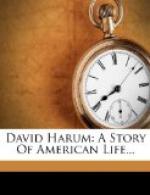“How ‘d ye make out yestidy?” he asked. “Git anythin’ out of old tongue-tied?” pointing with his thumb toward the front room.
“Oh, yes,” said John, smiling, as he recalled the unceasing flow of words which had enveloped Timson’s explanations.
“How much longer do you think you’ll have to have him ’round?” asked Mr. Harum.
“Well,” said John, “of course your customers are strangers to me, but so far as the routine of the office is concerned I think I can manage after to-day. But I shall have to appeal to you rather often for a while until I get thoroughly acquainted with my work.”
“Good fer you,” said David. “You’ve took holt a good sight quicker ’n I thought ye would, an’ I’ll spend more or less time ’round here fer a while, or be where you c’n reach me. It’s like this,” he continued; “Chet’s a helpless kind of critter, fer all his braggin’ an’ talk, an’ I ben feelin’ kind o’ wambly about turnin’ him loose—though the Lord knows,” he said with feeling, “’t I’ve had bother enough with him to kill a tree. But anyway I wrote to some folks I know up to Syrchester to git something fer him to do, an’ I got a letter to send him along, an’ mebbe they’d give him a show. See?”
“Yes, sir,” said John, “and if you are willing to take the chances of my mistakes I will undertake to get on without him.”
“All right,” said the banker, “we’ll call it a heat—and, say, don’t let on what I’ve told you. I want to see how long it’ll take to git all over the village that he didn’t ask no odds o’ nobody. Hadn’t ben out o’ a job three days ‘fore the’ was a lot o’ chances, an’ all ’t he had to do was to take his pick out o’ the lot on ’em.”
“Really?” said John.
“Yes, sir,” said David. “Some folks is gaited that way. Amusin’, ain’t it?—Hullo, Dick! Wa’al?”
“Willis’ll give two hunderd fer the sorr’l colt,” said the incomer, whom John recognized as one of the loungers in the Eagle bar the night of his arrival.
“E-um’m!” said David. “Was he speakin’ of any pertic’ler colt, or sorril colts in gen’ral? I hain’t got the only one the’ is, I s’pose.”
Dick merely laughed. “Because,” continued the owner of the “sorril colt,” “if Steve Willis wants to lay in sorril colts at two hunderd a piece, I ain’t goin’ to gainsay him, but you tell him that two-forty-nine ninety-nine won’t buy the one in my barn.” Dick laughed again.
John made a move in the direction of the front room.
“Hold on a minute,” said David. “Shake hands with Mr. Larrabee.”
“Seen ye before,” said Dick, as they shook hands. “I was in the barroom when you come in the other night,” and then he laughed as at the recollection of something very amusing.
John flushed a little and said, a bit stiffly, “I remember you were kind enough to help about my luggage.”
“Excuse me,” said Dick, conscious of the other’s manner. “I wa’n’t laughin’ at you, that is, not in pertic’ler. I couldn’t see your face when Ame offered ye pie an’ doughnuts instid of beefsteak an’ fixins. I c’d only guess at that; but Ame’s face was enough fer me,” and Dick went off into another cachinnation.




